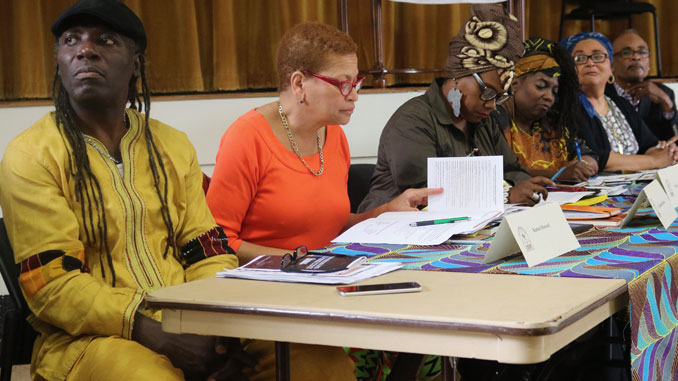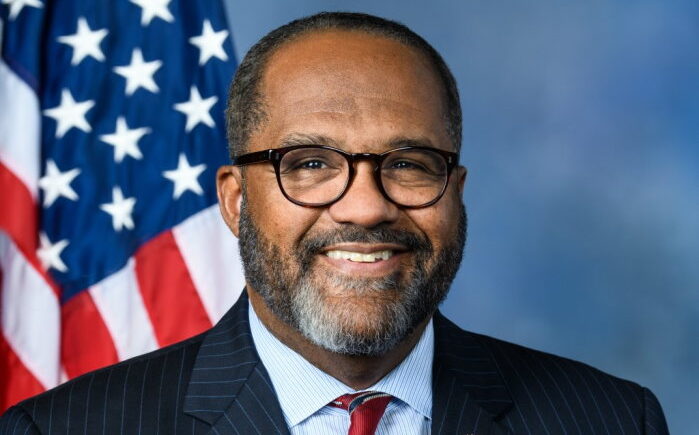
Story and Photos By Tyra Johnson
The National African-American Reparations Commission brought its struggle for reparations for people of African descent to New Orleans on Saturday, Dec. 2, 2017 at Xavier University. NAARC’s primary demand is that European nations compensate African descendants in the United States for the effects left behind from the cruelty of slavery. Through ten steps of reparation, NAARC believes proper healing of African-American people could take place. The ten steps range from acknowledgement of past actions, to rewriting the Criminal Justice System.
“The first of our ten-point platform is a formal apology. The apology is the center of reclaiming our dignity,” said Kamm Howard, the Co-Chairperson of the National Coalition of Blacks for Reparations in America. He believes European countries must own the crimes performed against people of color before any other steps can be taken. With the apology, Howard said, an African Holocaust Institute should be established, which would feature the roles of public and private organizations in slavery, systems of segregation, damages that happened during and after slavery, and systems, such as Jim Crow Laws, that created entitlement for Whites in society.
The following step is to create an African Knowledge Program, said Howard. He said the program will bridge the gap between Black people in the Diaspora and those on the African continent. Next, economic reparations would reverse the exclusion of Black people from financial mobility in the U.S.
“Our land has been systematically stolen, and the right to land for social and economic development is so important,” said Dr. Julianne Malveaux, the former President of Bennett College. She told the audience the United States had almost 130 Black-owned banks, but at the turn of the 19th Century, only 21 are in business. Establishing a Black Business Development Fund will kick-start competition with White counterparts, Malveaux said.
Reparations cannot be fulfilled if the community’s health is in danger, the commission’s members said. “Nana” Dr. Patricia Newton, the Chief Executive Officer of Black Psychiatrists of America, said centuries of slavery, economical and educational disparities, and all other struggles Black people have endured have turned the community into experts in dying.
“People become experts in what they do the most. This entire system has created nothing but death and destruction and debauchery for our people, globally, not just in the United ‘Snakes’ of America,” Newton said. Freeing the mind, eliminating fear, and demanding that healthcare as a holistic approach are steps that will allow Black people to be alive for what they are fighting for, she said.
Education is another gateway to rightful action, according to the commission. Graduates of Historically Black Colleges and Universities (HBCU) are important, because they bring their knowledge back to the community, said V.P. Franklin, the Editor for the Journal of African-American History. He said reparations should be used to pay off student debts of those who gave back to the Black community. “Reparations can be distributed to those who are involved in the kind of excellence in education,” Franklin said.
The commission said it is also seeking reparations to preserve sacred sites and monuments. “We need to know that we were buried in very scattered places,” said Yvette Modestin, the Founder and Executive Producer of Encuentro Diaspora, “And we need to recognize those spaces, so we can honor them in the rightful way.” Modestin said marked sites should include places where Black people were lynched, locations where massacres of Black people were committed, and displacements of Black neighborhoods.
These steps also seek to identify the Criminal Justice System as a form of slavery. Attorney Nkechi Taifa, a Human Rights Activist, refers to the U.S. Constitution as an excuse for mass incarceration. “In the 13th Amendment, neither slavery or involuntary servitude shall exist, except as punishment for a crime,” she said. Taifa spoke about how Black pride, wearing traditional African clothing, and exulting self-awareness, is now defined by the Federal Bureau of Investigation as Black Identity Extremists.
For centuries, Black people have struggled with proper historical recognition. “If you don’t own the communication system, your information will not get out. If you don’t own it, you’re depending on somebody else to tell it,” said Rev. JoAnn Watson, a former Detroit City Councilmember. She said without complete control over the information, White counterparts will spread lies that people will digest as truth.
Dr. C. Reynold Verret, Xavier’s President, told the audience, “There’s mythology of America, and there’s the truth of America. The truth of America is about what has been done, and what we must now do.”
The impact of continuous disparities was not limited to the United States, the Caribbean and surrounding areas were affected, also.
“I’m not from the Caribbean. I’m from another place where this crime was committed,” said Sir Hillary Beckles, the Keynote Speaker and Vice-Chancellor of the University of the West Indies in Mona, Jamaica. Beckles believes slavery was a global crime upon one people for the advancement of other people.
“When we say reparations now, just turn that word now around, and what we will get is won. Reparations won,” Beckles said.
Recommended For You.



Be the first to comment